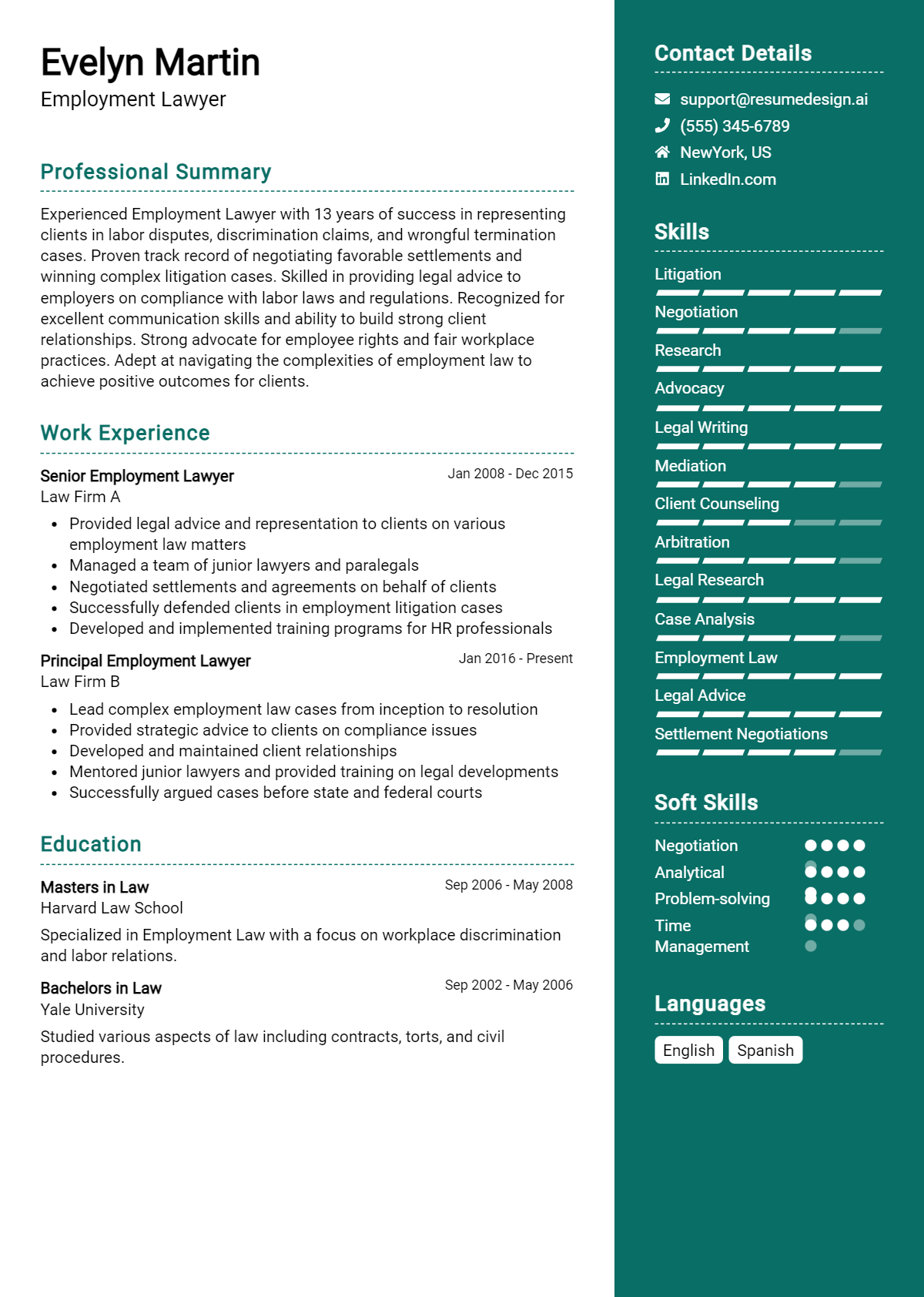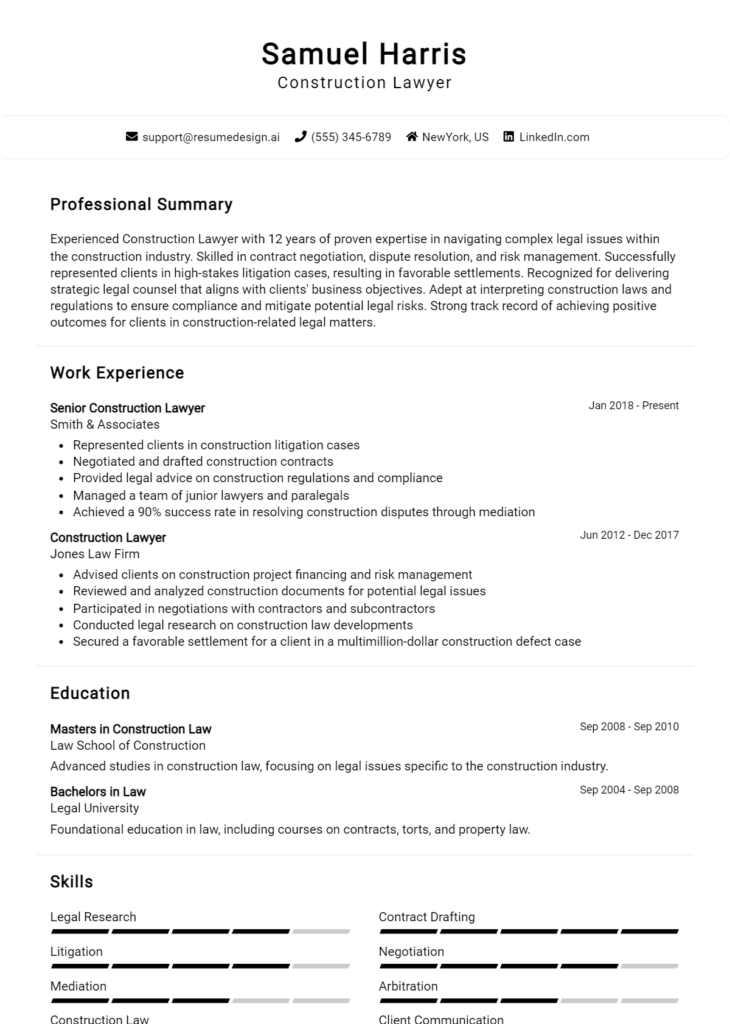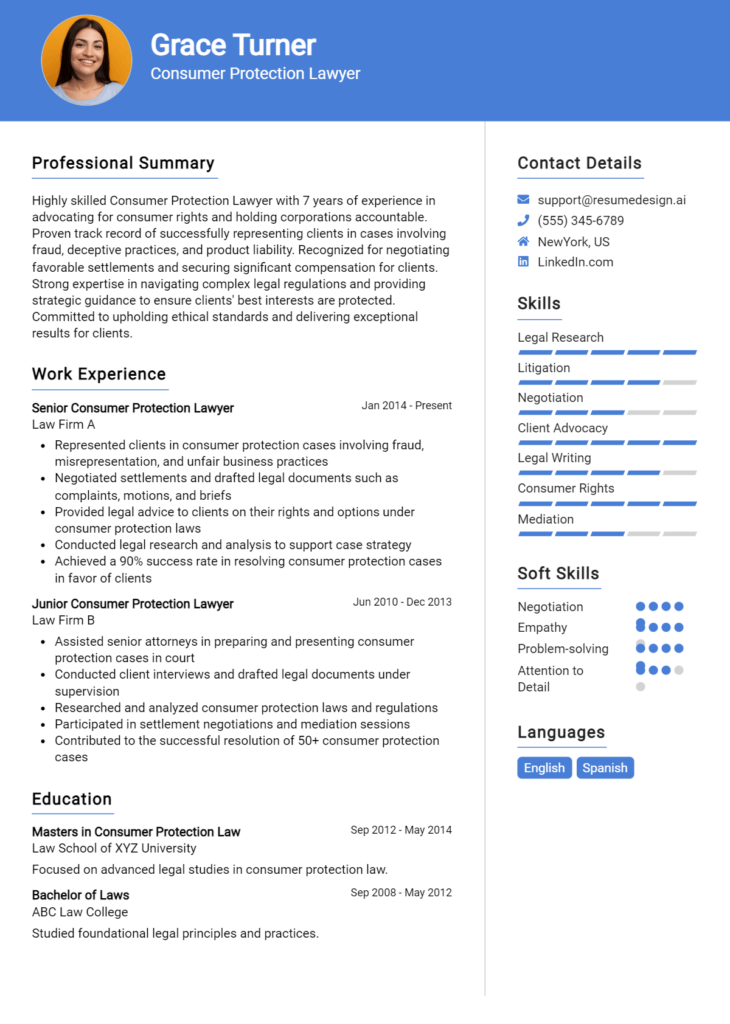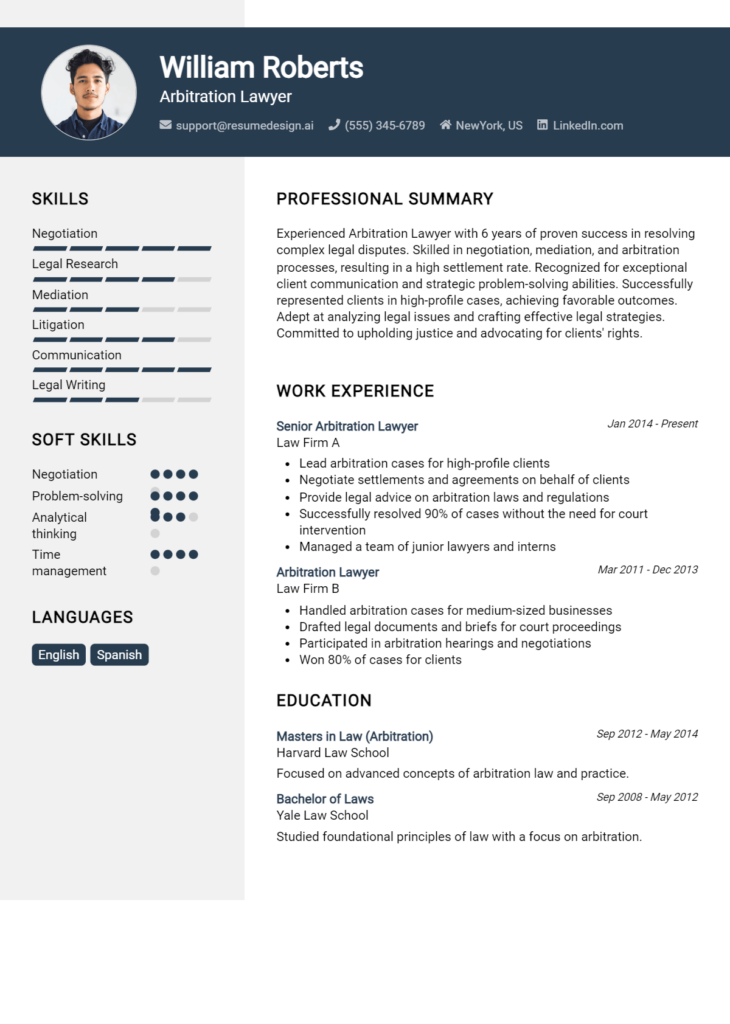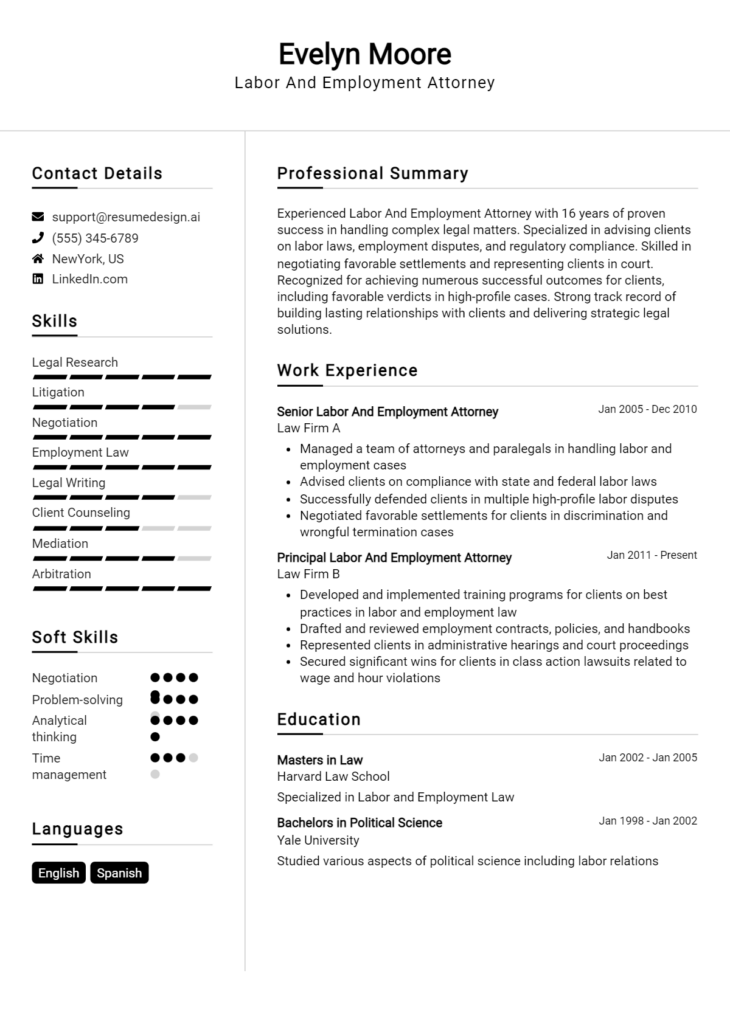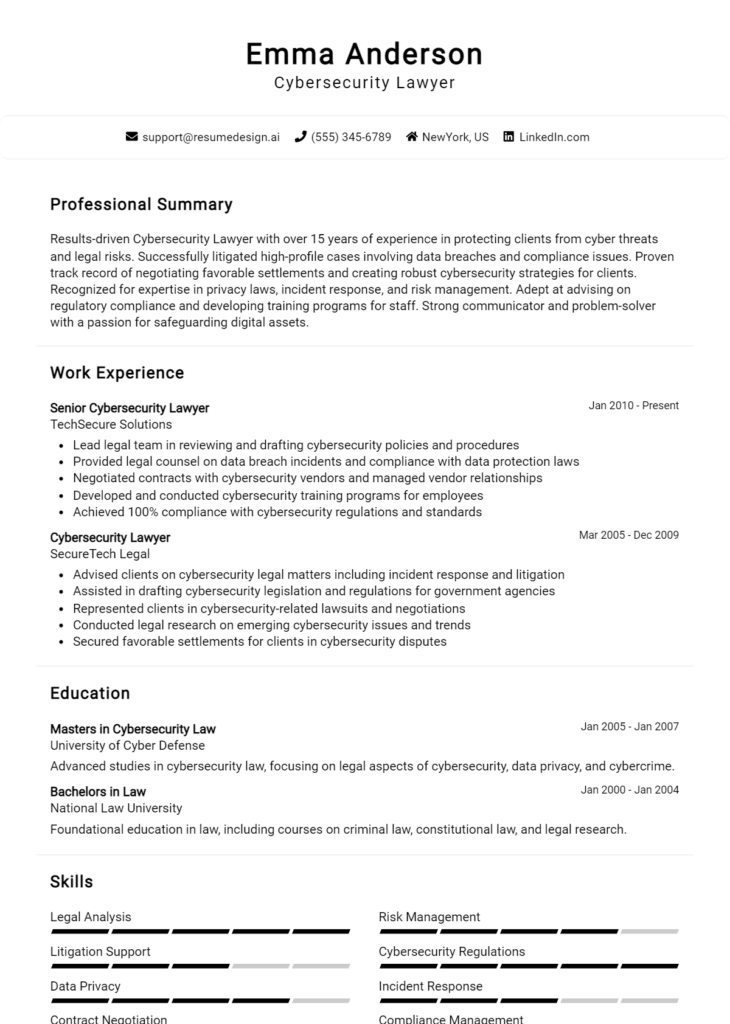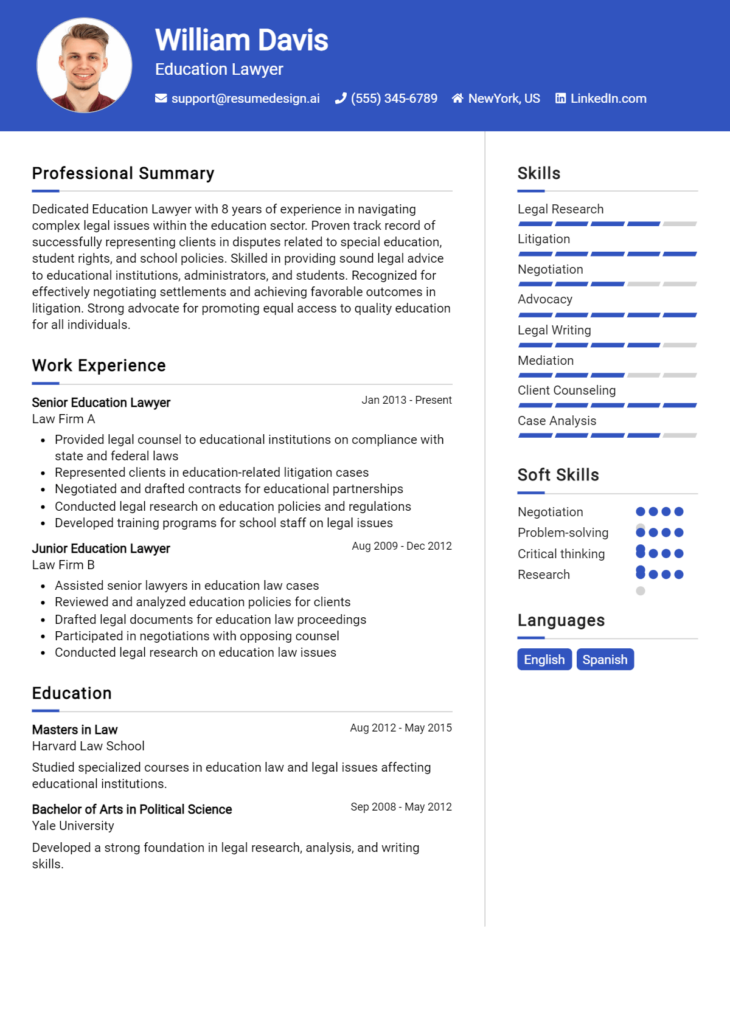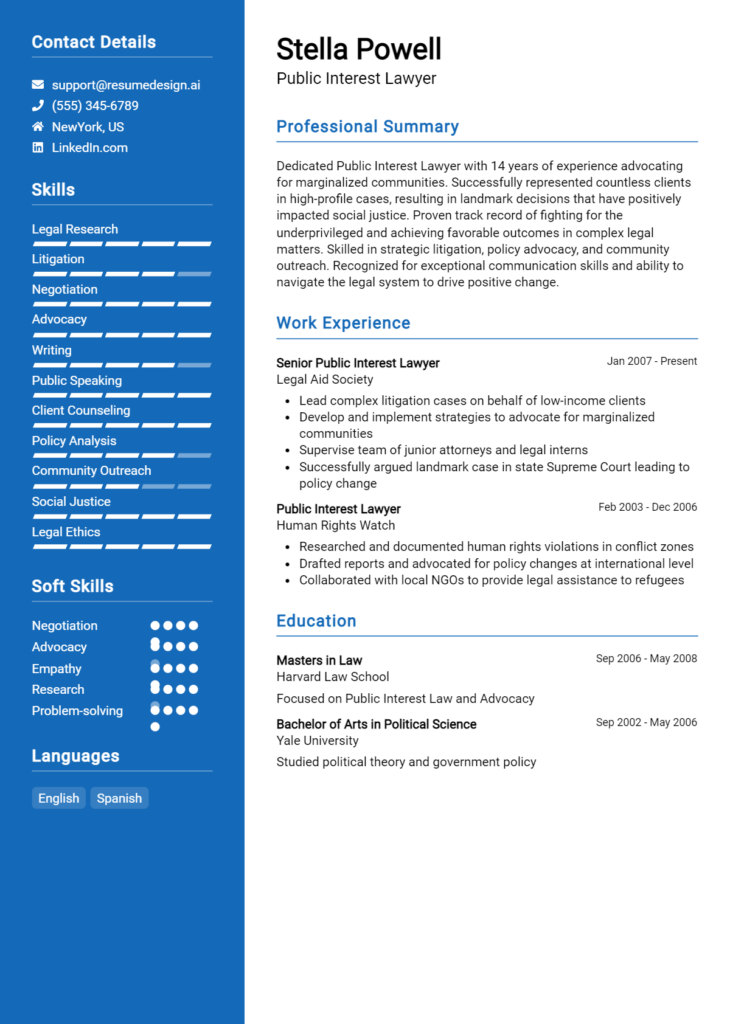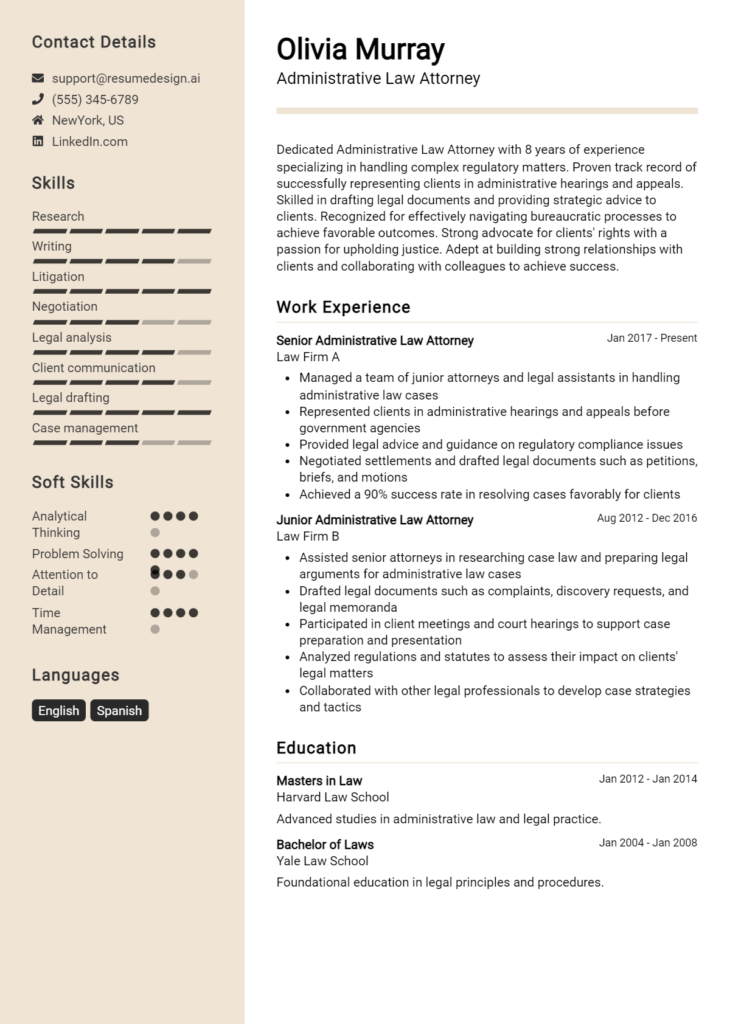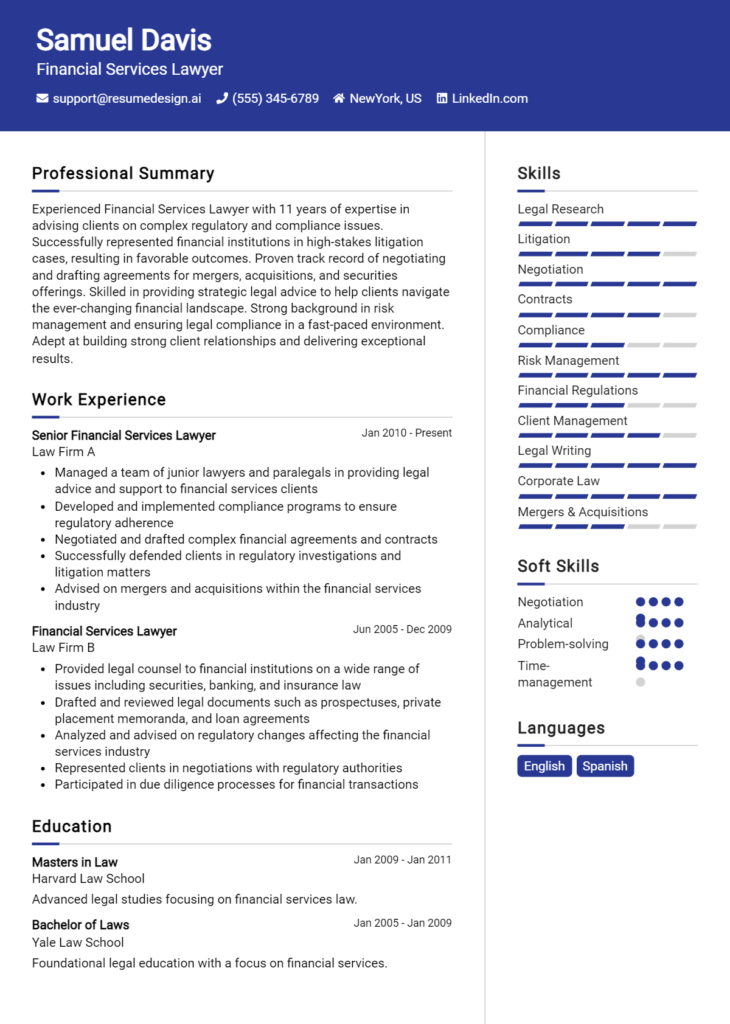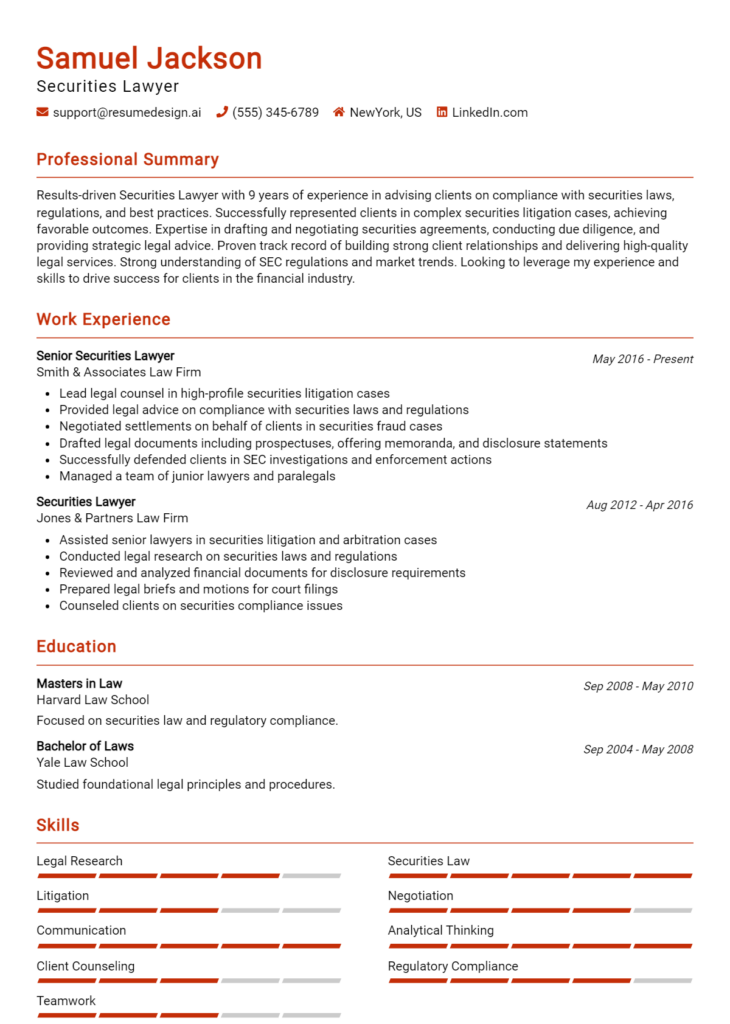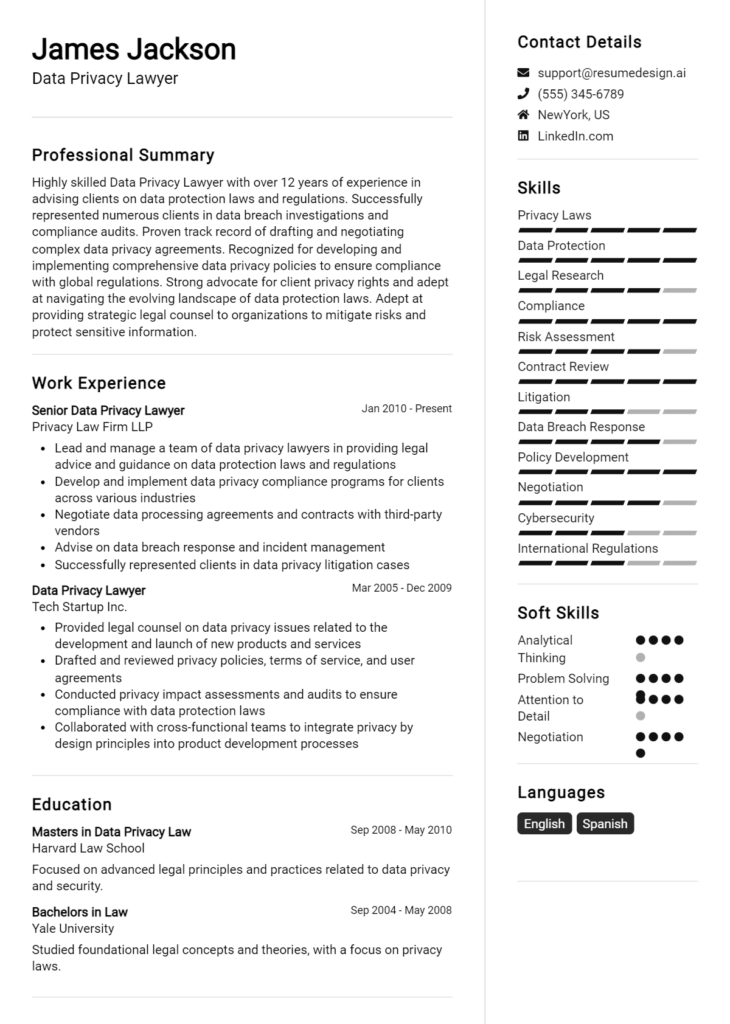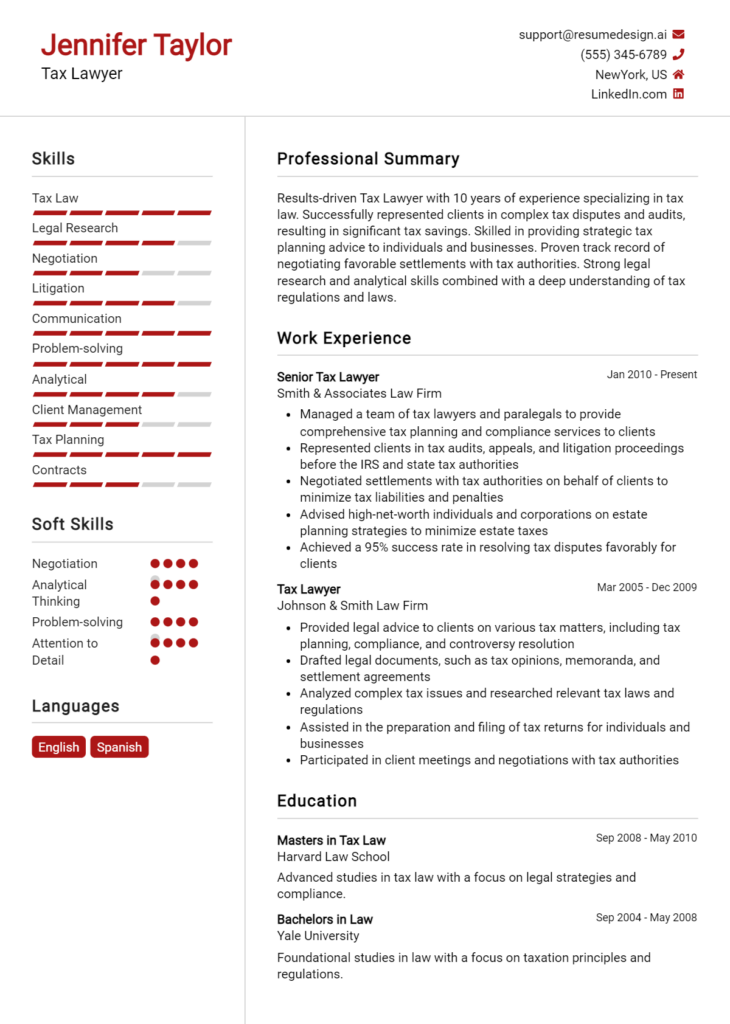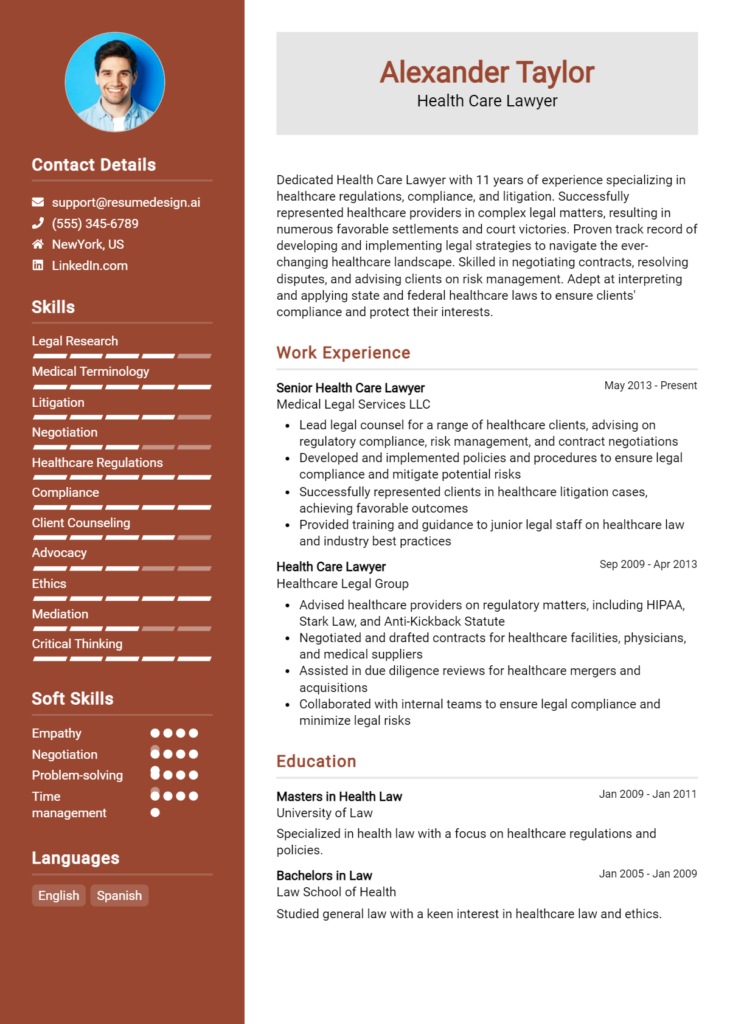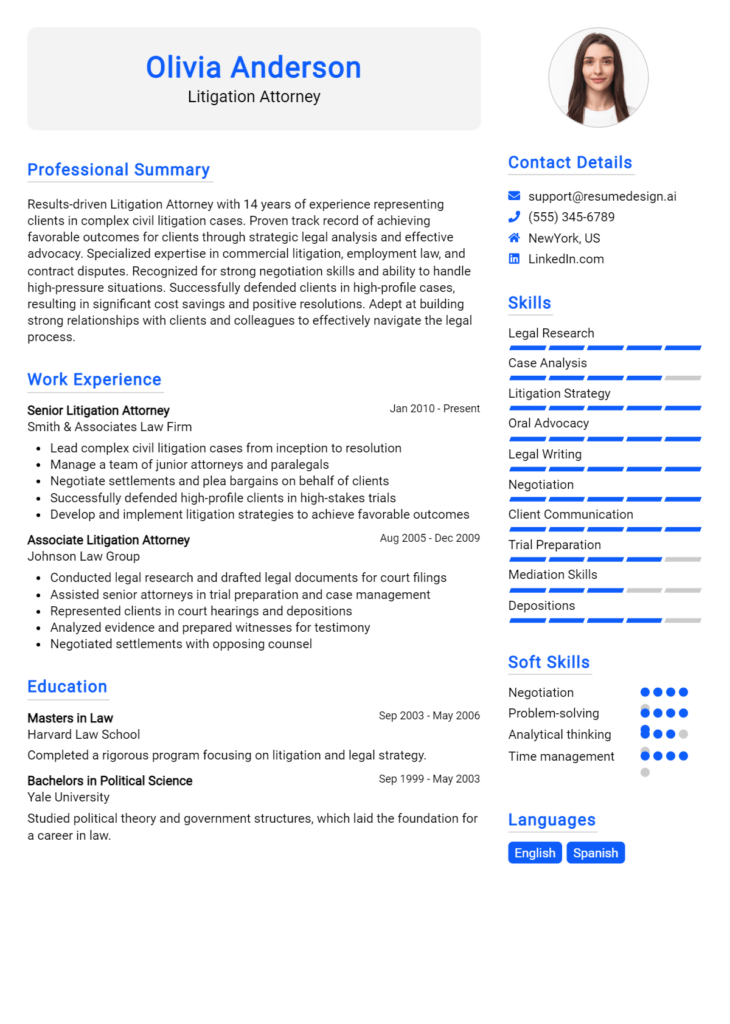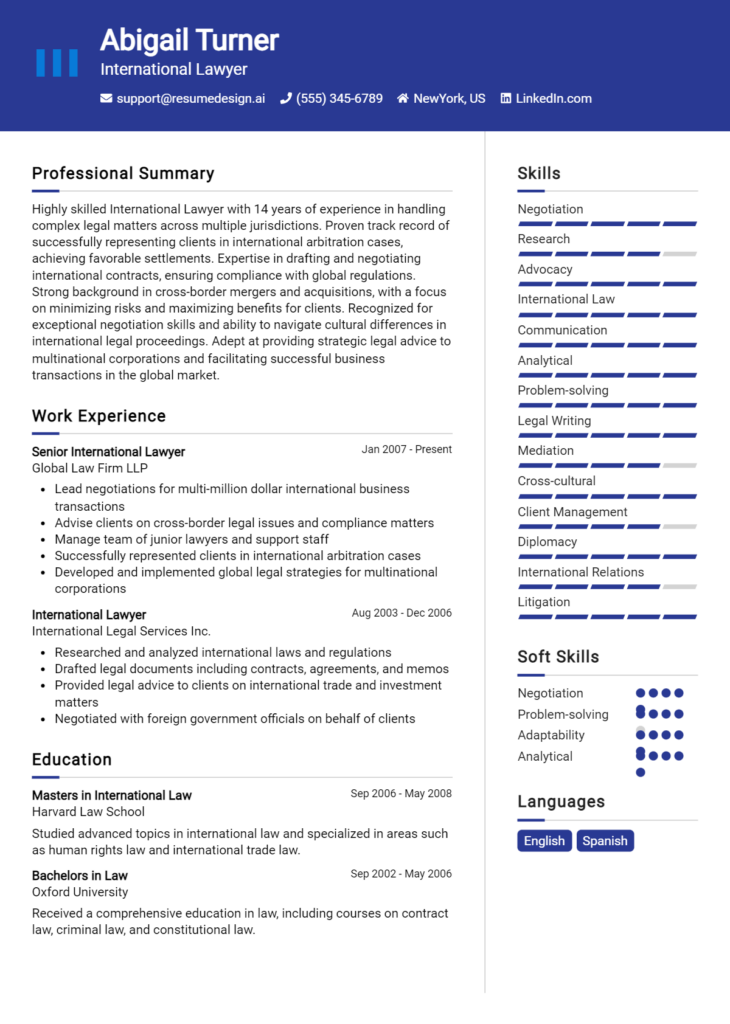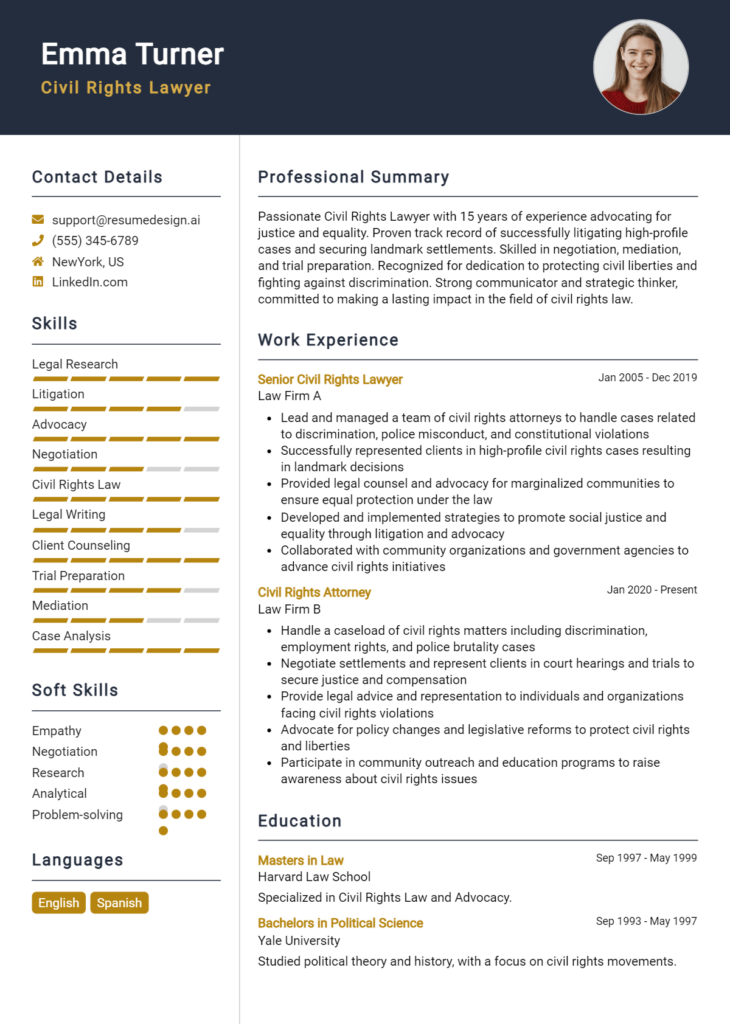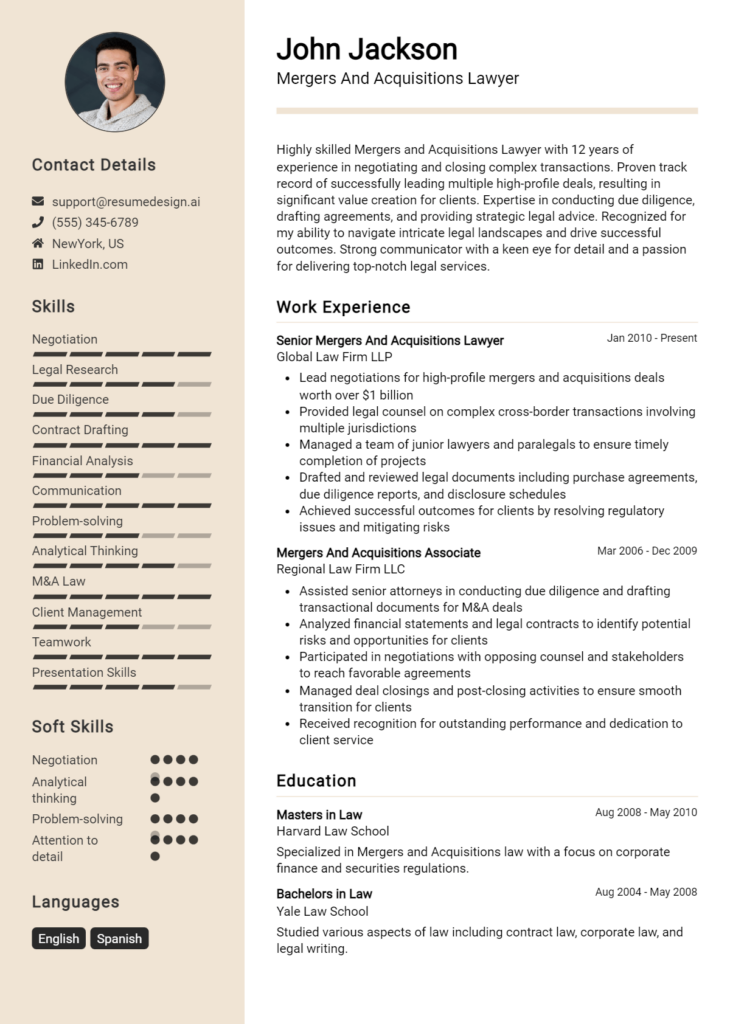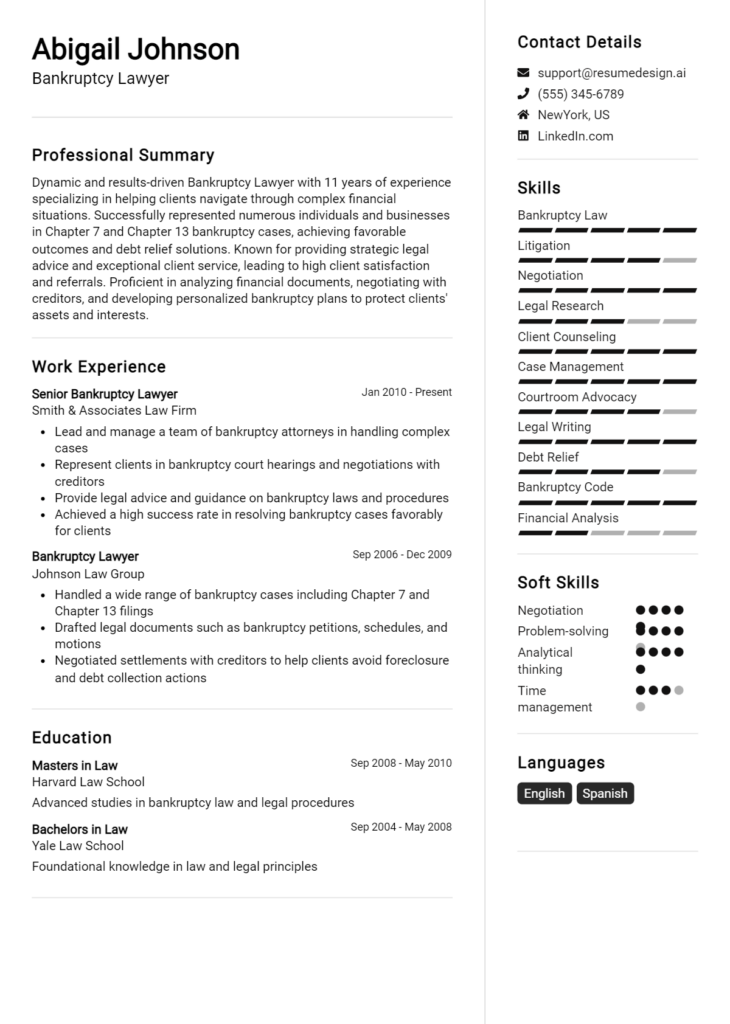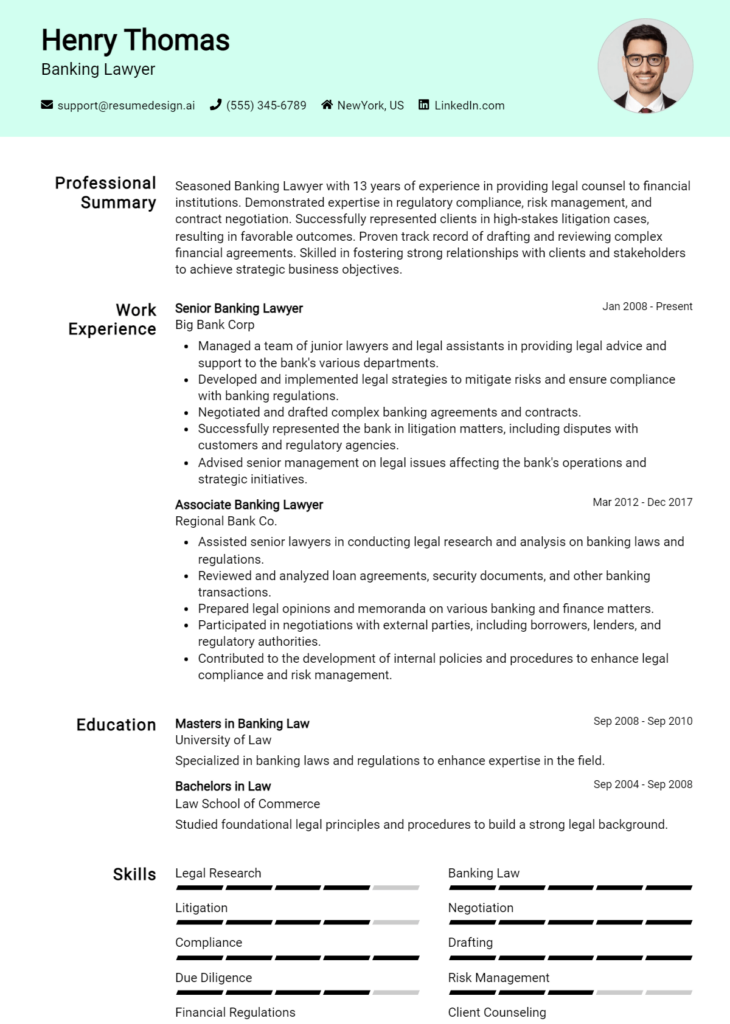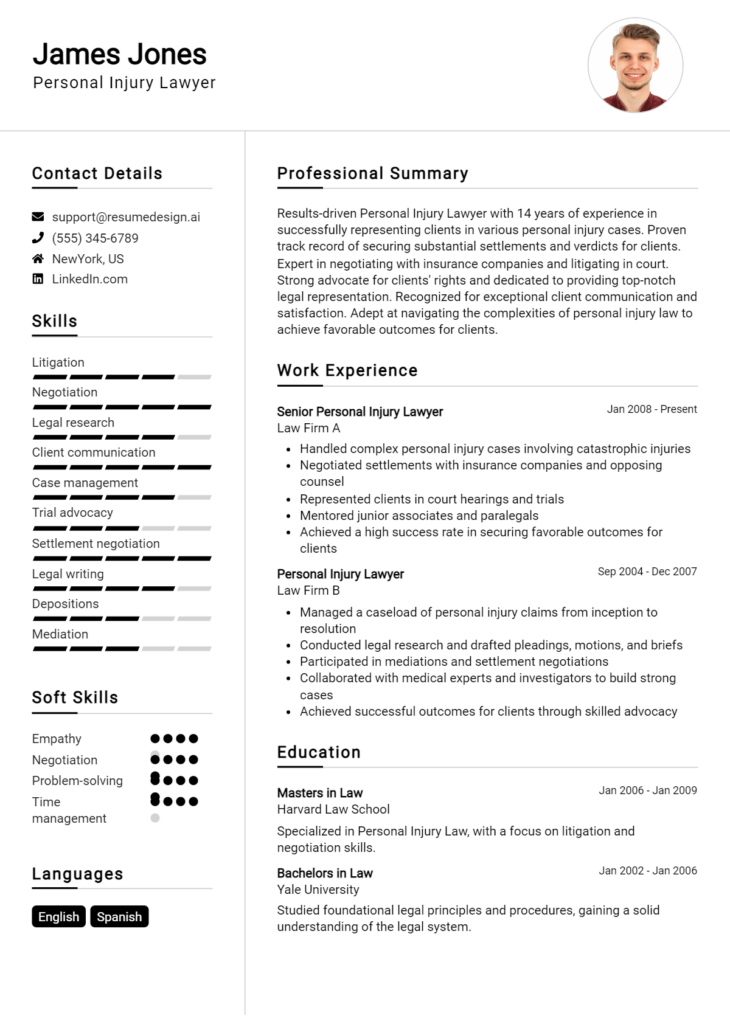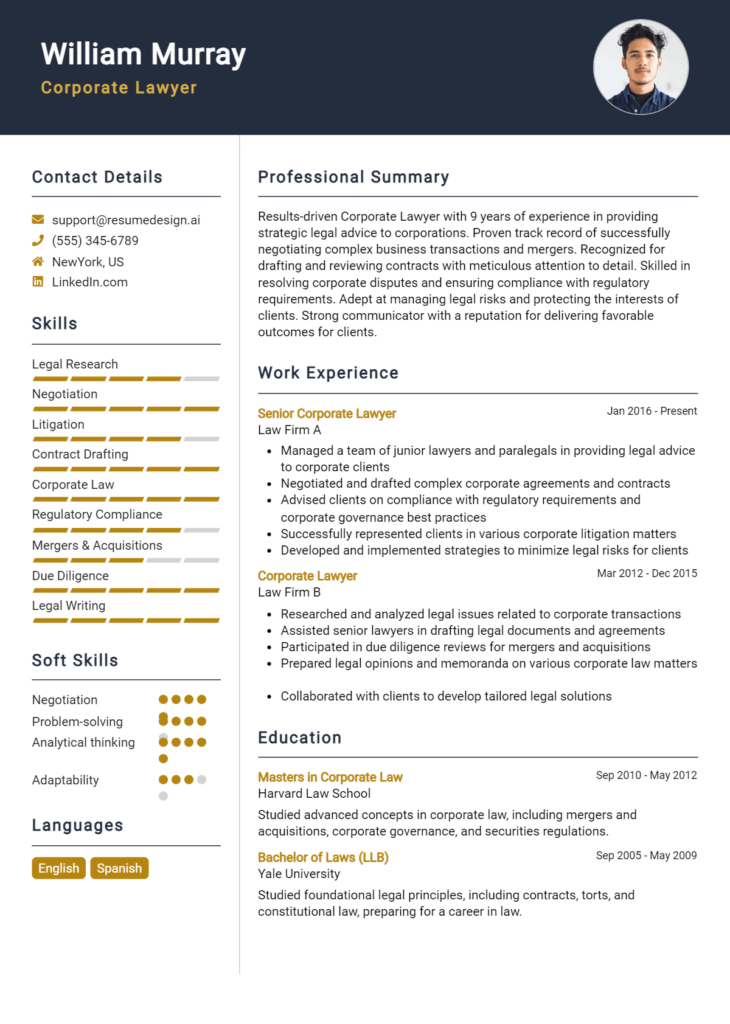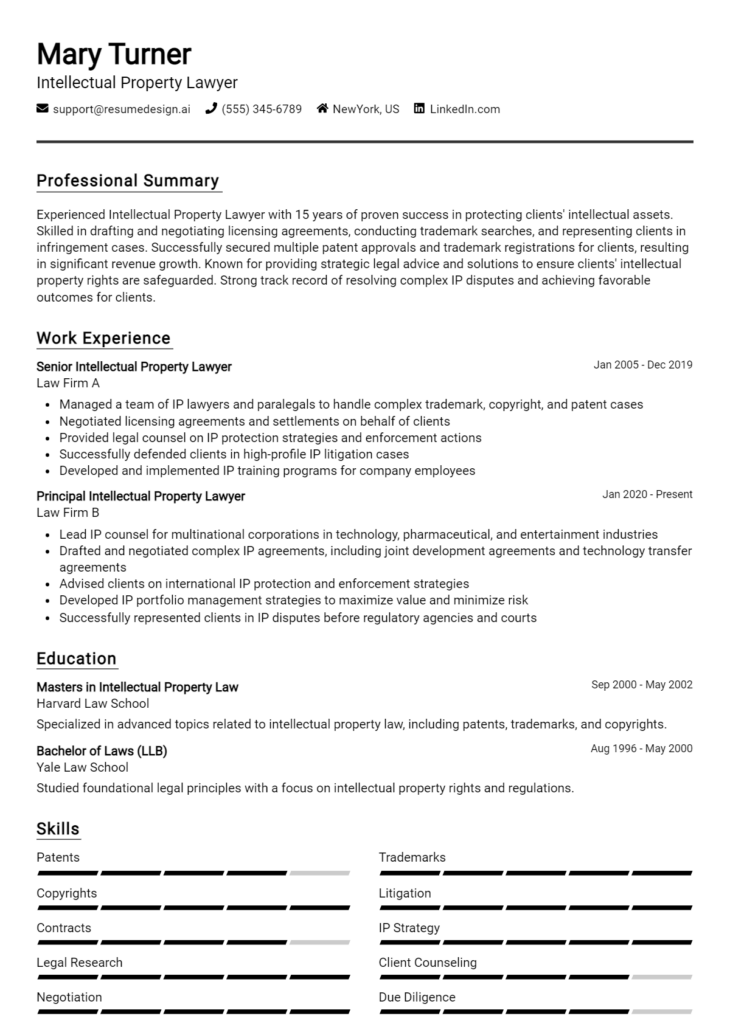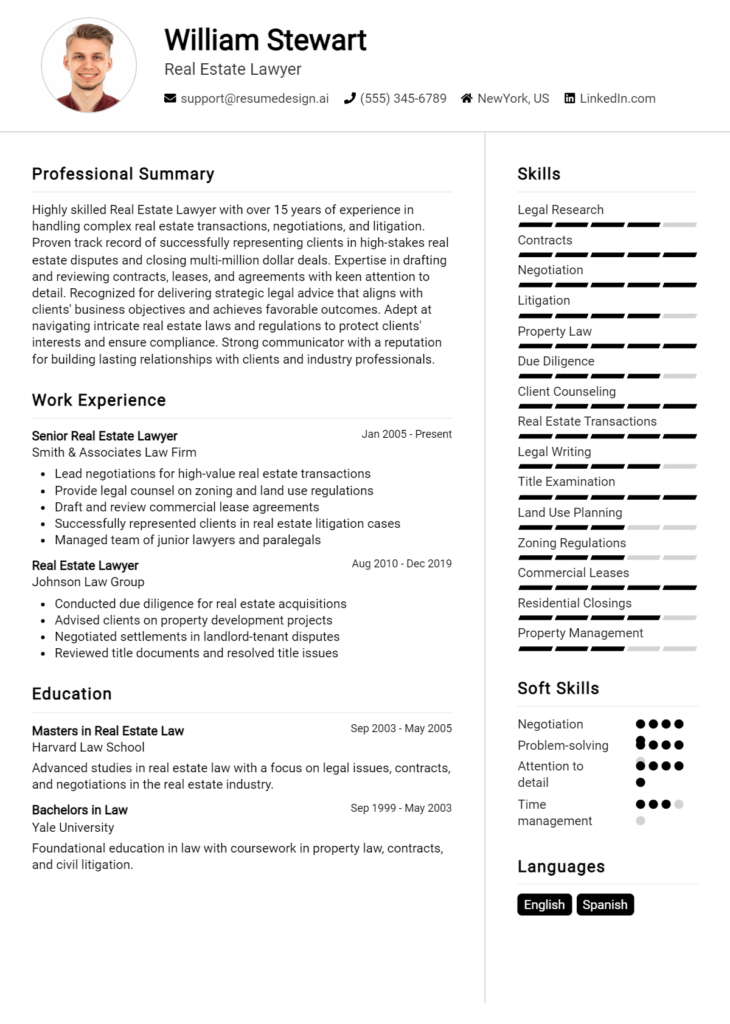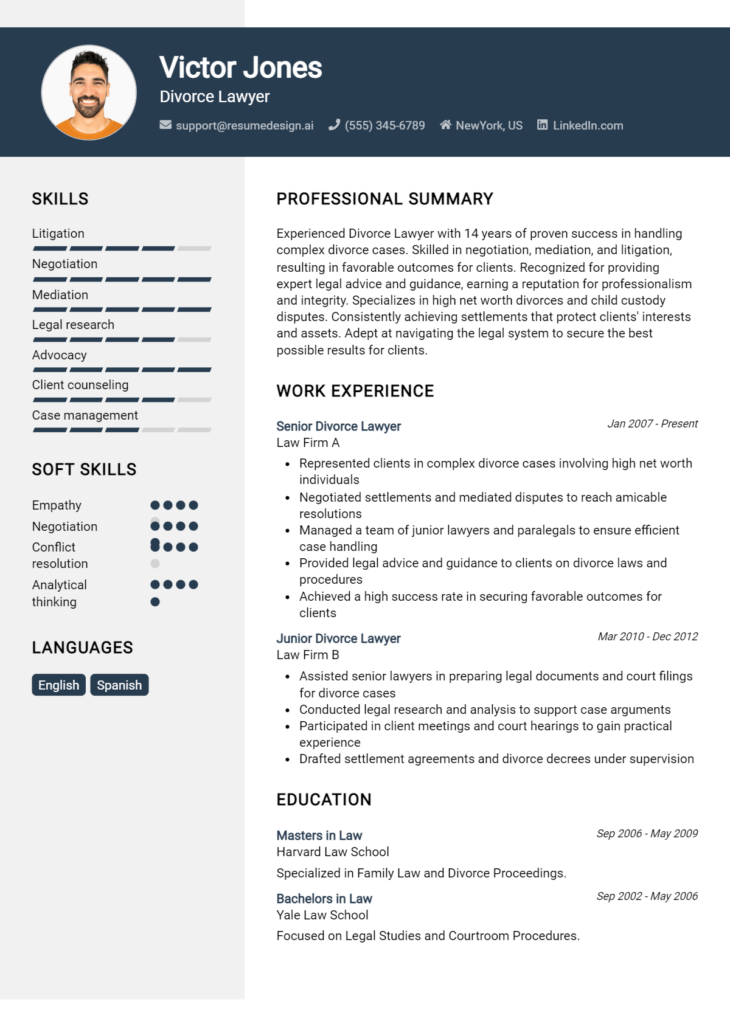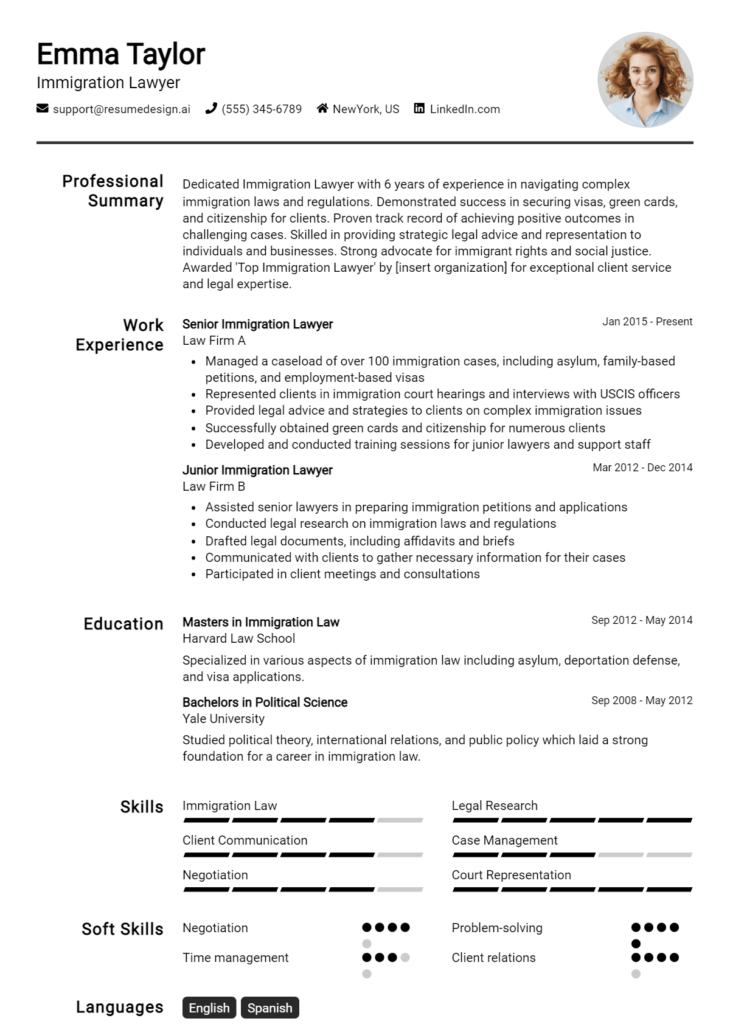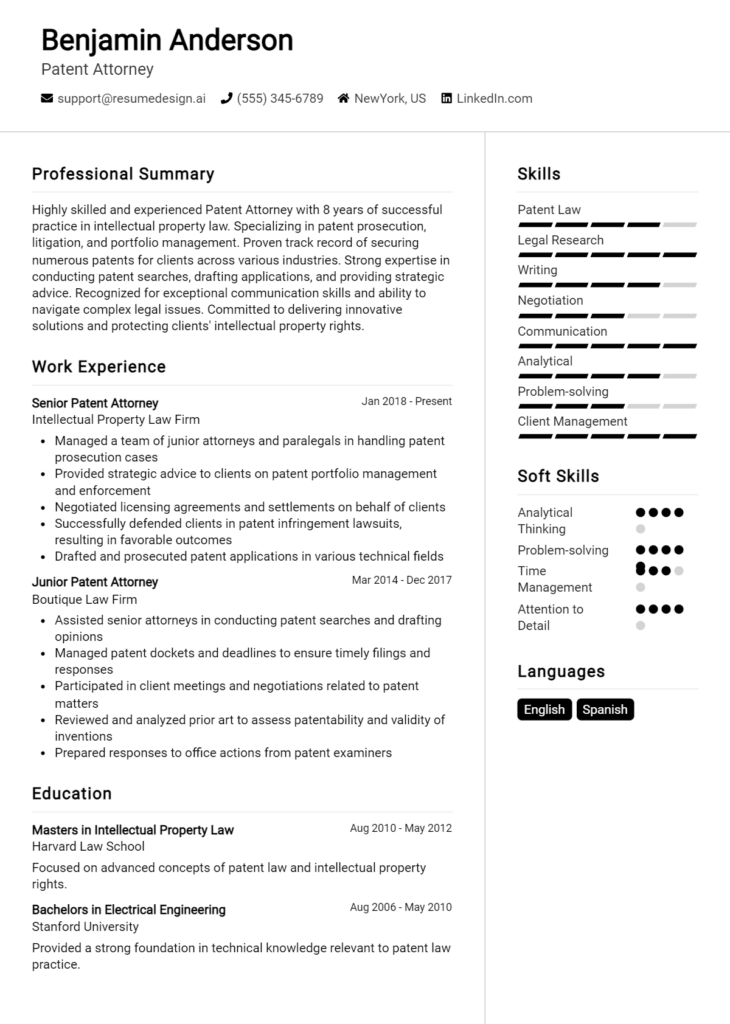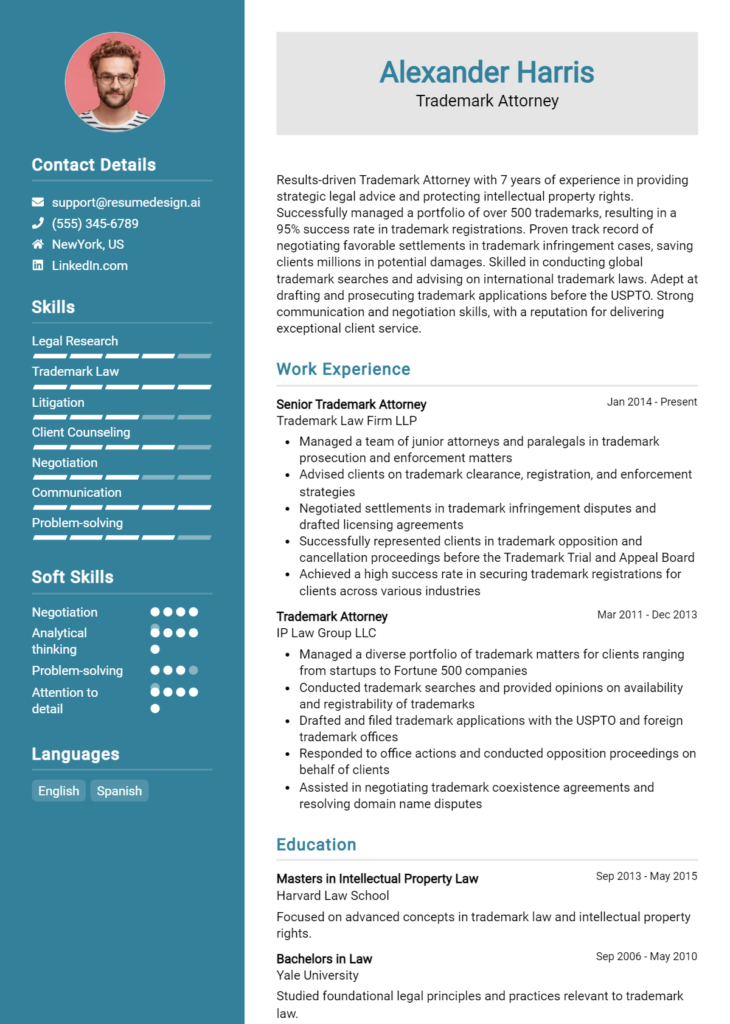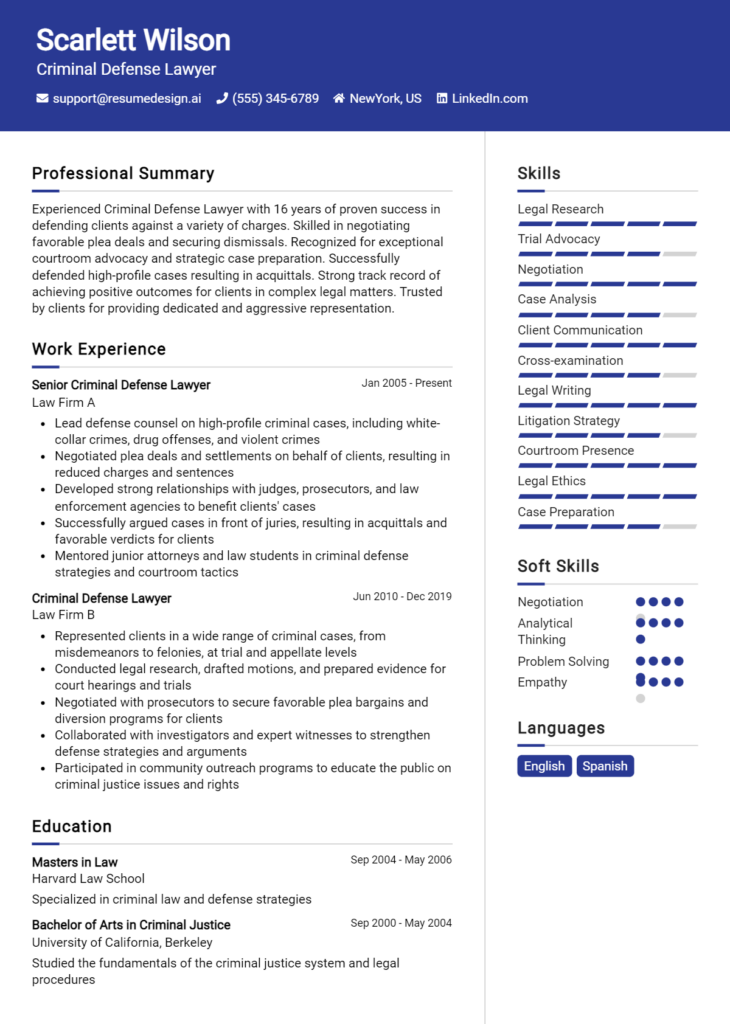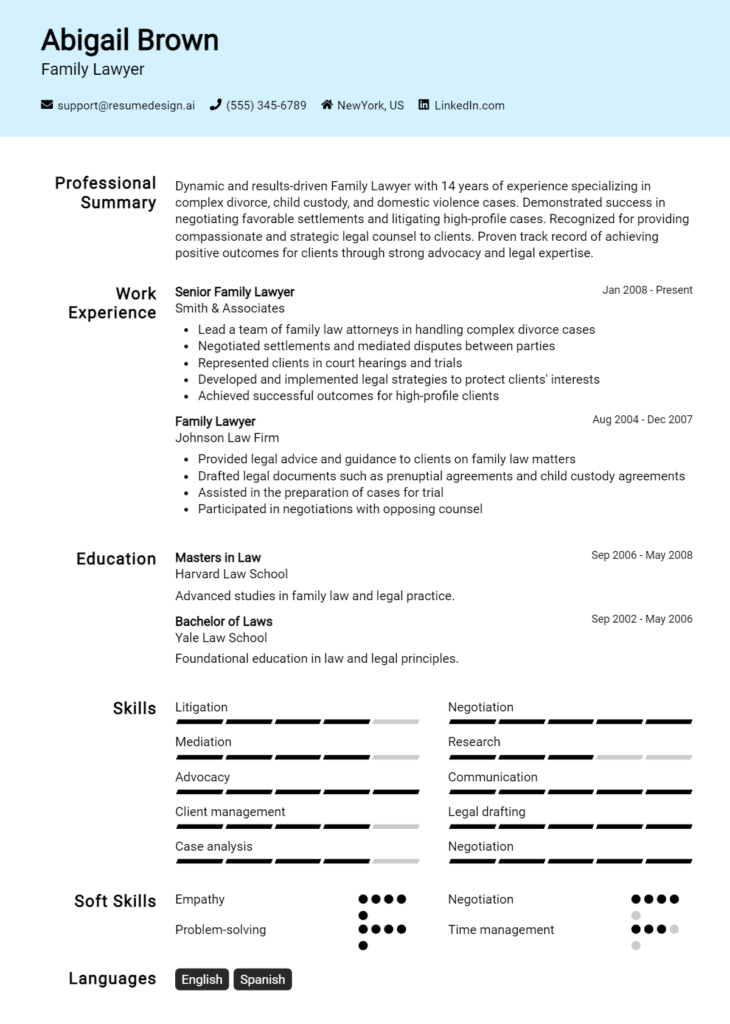Employment Lawyer Core Responsibilities
Employment lawyers play a crucial role in ensuring compliance with labor laws and protecting employee rights within an organization. Their key responsibilities include advising on employment contracts, resolving disputes, and representing clients in legal proceedings. Strong technical, operational, and problem-solving skills are essential in navigating complex legal frameworks and bridging communication between HR, management, and employees. A well-crafted resume that highlights these abilities can significantly contribute to achieving organizational goals, showcasing the lawyer's integral role in fostering a fair workplace.
Common Responsibilities Listed on Employment Lawyer Resume
- Drafting and reviewing employment contracts and policies.
- Advising clients on compliance with labor laws and regulations.
- Representing clients in arbitration and litigation proceedings.
- Conducting workplace investigations into grievances and disputes.
- Providing training on employment law compliance to HR staff.
- Negotiating settlements and mediating disputes.
- Researching and staying updated on employment law changes.
- Assisting in the development of workplace policies and procedures.
- Advising on issues related to discrimination, harassment, and wrongful termination.
- Collaborating with management to mitigate legal risks.
- Analyzing and interpreting labor agreements and regulations.
High-Level Resume Tips for Employment Lawyer Professionals
A well-crafted resume is a vital tool for Employment Lawyer professionals seeking to make a strong first impression on potential employers. In a competitive legal landscape, your resume serves as the initial touchpoint, encapsulating your skills, experiences, and achievements in a concise format. It is essential that this document not only highlights your qualifications but also aligns with the specific demands of the employment law sector. This guide will provide practical and actionable resume tips tailored specifically for Employment Lawyer professionals, ensuring that you stand out in the job market.
Top Resume Tips for Employment Lawyer Professionals
- Tailor your resume to the specific job description by emphasizing relevant skills and experiences that align with the position.
- Highlight your experience in employment law, including any specialized areas such as labor disputes, discrimination claims, or compliance issues.
- Quantify your achievements with specific metrics, such as the number of cases won, settlements negotiated, or compliance issues resolved.
- Showcase your understanding of employment regulations and laws, including any certifications or training you have completed.
- Incorporate keywords from the job description to ensure your resume passes through Applicant Tracking Systems (ATS).
- Use a clear and professional format that enhances readability, making it easy for hiring managers to navigate your qualifications.
- Include relevant pro bono work or volunteer experiences that demonstrate your commitment to employment law and community service.
- Highlight soft skills such as negotiation, communication, and analytical thinking, which are crucial in the legal profession.
- Keep your resume concise, ideally one page, and focus on the most relevant experiences that showcase your legal expertise.
- Consider adding a summary statement at the top of your resume to succinctly convey your professional identity and goals.
By implementing these tips, you can significantly enhance your chances of landing a job in the Employment Lawyer field. A tailored and well-structured resume not only showcases your qualifications but also reflects your professionalism and attention to detail, qualities that are paramount in legal practice.
Why Resume Headlines & Titles are Important for Employment Lawyer
In the competitive field of employment law, crafting a resume that stands out is crucial for success. One of the key elements that can elevate a candidate's resume is the use of strong headlines and titles. A well-crafted headline serves as a first impression, capturing the attention of hiring managers and summarizing key qualifications in a single impactful phrase. It should be concise, relevant, and directly related to the position being applied for, effectively showcasing the candidate's value proposition and encouraging further exploration of their qualifications.
Best Practices for Crafting Resume Headlines for Employment Lawyer
- Keep it concise: Limit the headline to a single phrase or sentence for easy readability.
- Be specific: Use terminology and keywords relevant to employment law to demonstrate expertise.
- Highlight your strengths: Focus on your most notable skills, experiences, or accomplishments.
- Tailor to the job: Customize the headline for each application to align with the specific role.
- Use action words: Begin with strong action verbs to convey confidence and proactivity.
- Include relevant qualifications: Mention any certifications, degrees, or specializations that enhance your candidacy.
- Avoid clichés: Steer clear of overused phrases that dilute the uniqueness of your application.
- Maintain professionalism: Ensure the tone and language reflect the seriousness of the legal profession.
Example Resume Headlines for Employment Lawyer
Strong Resume Headlines
Dynamic Employment Lawyer with 10+ Years of Experience in Labor Relations and Compliance
Experienced Advocate for Employee Rights | Proven Track Record in Litigation and Mediation
Strategic Employment Law Specialist | Expert in Workplace Discrimination and Harassment Cases
Weak Resume Headlines
Lawyer Looking for Job
Employment Law Professional
The strong headlines are effective because they immediately convey specific expertise and experience, making a compelling case for the candidate's fit for the role. They utilize impactful language and relevant keywords that resonate with hiring managers in the legal field. In contrast, the weak headlines lack specificity and fail to highlight the candidate's unique qualifications, making them forgettable and unremarkable in a competitive job market.
Writing an Exceptional Employment Lawyer Resume Summary
A well-crafted resume summary is essential for an Employment Lawyer as it serves as a powerful introduction that quickly captures the attention of hiring managers. In an industry where expertise, negotiation skills, and a deep understanding of labor laws are crucial, a strong summary highlights key skills, relevant experience, and notable accomplishments succinctly. This brief overview sets the stage for the rest of the resume, emphasizing the candidate's qualifications tailored to the specific job they are applying for. By being concise yet impactful, the summary can differentiate a candidate in a competitive job market.
Best Practices for Writing a Employment Lawyer Resume Summary
- Quantify Achievements: Use specific numbers or percentages to demonstrate your impact in previous roles.
- Focus on Relevant Skills: Highlight skills that are directly applicable to the job description, such as negotiation, dispute resolution, and compliance.
- Tailor for the Job: Customize your summary for each application to align closely with the employer’s needs and values.
- Keep It Concise: Aim for 3-5 sentences that effectively convey your qualifications without overwhelming the reader.
- Showcase Accomplishments: Mention notable cases won or significant settlements achieved to illustrate your success.
- Use Action Verbs: Start sentences with strong action verbs to energize your summary and convey a sense of proactivity.
- Maintain Professional Tone: Ensure the language is formal and appropriate for the legal field, avoiding casual phrases.
- Highlight Continued Education: If applicable, mention any specialized training or certifications relevant to employment law.
Example Employment Lawyer Resume Summaries
Strong Resume Summaries
Dynamic Employment Lawyer with over 8 years of experience in labor law, successfully representing clients in over 40 arbitration cases and achieving a 95% success rate in settlement negotiations. Proven expertise in drafting employment contracts and navigating complex compliance issues, ensuring clients remain within legal boundaries while maximizing their rights.
Results-driven Employment Attorney skilled in workplace investigations and dispute resolution, having handled over 100 cases with a focus on minimizing employer liability. Recognized for implementing employee training programs that reduced workplace grievances by 30% in one year.
Dedicated Employment Lawyer with 12 years of experience specializing in discrimination and wrongful termination cases. Successfully secured over $2 million in settlements for clients through strategic negotiation and litigation, coupled with a robust understanding of federal and state employment regulations.
Weak Resume Summaries
Experienced lawyer with knowledge of employment law. I have handled various cases and am looking for new opportunities.
Employment Lawyer with a general understanding of legal matters. I am a hard worker and dedicated to helping my clients.
The examples of strong resume summaries are considered effective because they provide specific details about the candidate's experience, quantify their achievements, and highlight relevant skills that align closely with the role of an Employment Lawyer. In contrast, the weak summaries lack specificity, measurable outcomes, and do not convey the candidate's unique qualifications, making them less likely to capture the interest of hiring managers.
Work Experience Section for Employment Lawyer Resume
The work experience section of an Employment Lawyer's resume is a critical component that allows candidates to demonstrate their technical skills, management capabilities, and the ability to produce high-quality legal outcomes. This section not only highlights the candidate's relevant experience but also showcases their achievements in a manner that aligns with industry standards. Quantifying accomplishments—such as the number of cases won, settlements achieved, or teams successfully managed—provides concrete evidence of the candidate’s effectiveness and expertise in employment law. By carefully curating this section, candidates can effectively communicate their value to potential employers.
Best Practices for Employment Lawyer Work Experience
- Focus on relevant experience that directly relates to employment law.
- Quantify achievements, such as the number of successful cases or settlements.
- Highlight technical skills, including proficiency in legal research and document drafting.
- Showcase leadership abilities by mentioning team management or mentorship roles.
- Use action verbs to convey a sense of initiative and responsibility.
- Align descriptions with industry standards and legal terminology.
- Incorporate client feedback or testimonials to demonstrate effectiveness.
- Keep descriptions concise and targeted to maintain the reader's attention.
Example Work Experiences for Employment Lawyer
Strong Experiences
- Successfully represented over 50 clients in employment discrimination cases, achieving a 90% win rate and securing settlements totaling over $2 million.
- Led a team of junior attorneys in a high-profile wrongful termination case, resulting in a favorable jury verdict and significant media coverage.
- Developed comprehensive training programs for HR departments on compliance with labor laws, which reduced the number of legal disputes by 40% in one year.
- Managed a caseload of 75+ employment law cases simultaneously, utilizing advanced case management software to enhance efficiency and client communication.
Weak Experiences
- Worked on various legal cases with little detail on specific outcomes or roles.
- Assisted senior lawyers with paperwork and filing without mentioning any quantifiable contributions.
- Participated in client meetings but did not specify involvement levels or results achieved.
- Helped draft contracts and documents with no mention of the impact or success of those documents.
The examples provided are considered strong because they clearly highlight quantifiable results, such as win rates and financial settlements, while also demonstrating leadership and specific contributions to team efforts. In contrast, the weak experiences lack detail and measurable outcomes, making it difficult for potential employers to assess the candidate's impact or effectiveness in previous roles. A strong work experience section should articulate both the scope and success of the candidate's contributions in a compelling manner.
Education and Certifications Section for Employment Lawyer Resume
The education and certifications section of an Employment Lawyer's resume is a vital component that showcases the candidate's academic journey, professional credentials, and commitment to ongoing learning in the field of employment law. This section not only highlights the foundational knowledge gained through law school but also underscores the importance of industry-relevant certifications and specialized training, which can set a candidate apart in a competitive job market. By providing details on relevant coursework and certifications, candidates can enhance their credibility and demonstrate a strong alignment with the demands of the role, making a compelling case for their candidacy.
Best Practices for Employment Lawyer Education and Certifications
- Prioritize relevant degrees, such as a Juris Doctor (JD) from an accredited law school.
- Include industry-recognized certifications, such as the Certified Employment Law Specialist (CELS).
- Detail relevant coursework that pertains directly to employment law, labor relations, and dispute resolution.
- Highlight any continuing education or specialized training, demonstrating commitment to professional development.
- Present information in reverse chronological order, starting with the most recent qualifications.
- Use clear and concise language, avoiding jargon or overly technical terms that may confuse the reader.
- Be specific about the institution and dates of attendance to enhance transparency.
- Consider adding memberships in professional organizations related to employment law, showcasing active engagement in the field.
Example Education and Certifications for Employment Lawyer
Strong Examples
- Juris Doctor (JD), Harvard Law School, Graduated May 2020
- Certified Employment Law Specialist (CELS), National Association of Employment Lawyers, 2021
- Relevant Coursework: Employment Discrimination Law, Labor Relations, Workplace Harassment Prevention
- Certificate in Alternative Dispute Resolution, University of California, 2019
Weak Examples
- Bachelor of Arts in History, State University, Graduated 2010
- Certification in General Business Management, Community College, 2015
- Completed online course in Real Estate Law, 2020
- High School Diploma, Local High School, Graduated 2006
The examples provided serve to illustrate the distinction between strong and weak educational qualifications for an Employment Lawyer. Strong examples demonstrate a direct connection to employment law through relevant degrees, certifications, and coursework, showcasing the candidate's expertise and commitment to the field. Conversely, weak examples reflect qualifications that lack relevance to employment law, indicating a potential misalignment with the role's requirements and diminishing the candidate's credibility in the eyes of potential employers.
Top Skills & Keywords for Employment Lawyer Resume
In the competitive field of employment law, a well-crafted resume that highlights your skills is crucial for standing out to potential employers. Skills not only showcase your qualifications and expertise but also demonstrate your ability to navigate complex legal scenarios and effectively represent clients. A strong resume for an Employment Lawyer should include both hard and soft skills, as employers seek candidates who possess the technical knowledge to handle legal matters while also exhibiting interpersonal abilities essential for client interactions and negotiations. Below, we explore the top hard and soft skills that can enhance your resume and increase your chances of landing that coveted position in employment law.
Top Hard & Soft Skills for Employment Lawyer
Soft Skills
- Excellent Communication
- Critical Thinking
- Negotiation Skills
- Empathy and Understanding
- Problem-Solving
- Time Management
- Attention to Detail
- Client Relationship Management
- Persuasiveness
- Adaptability
- Team Collaboration
- Ethical Judgment
- Conflict Resolution
- Active Listening
- Research Skills
Hard Skills
- Knowledge of Employment Law
- Legal Research and Writing
- Case Management
- Litigation Experience
- Contract Drafting
- Regulatory Compliance
- Mediation and Arbitration
- Familiarity with Labor Relations
- Trial Preparation
- Familiarity with Employment Policies and Procedures
- Document Review
- Legal Analysis
- Proficiency in Legal Software
- Understanding of HR Practices
- Familiarity with Workplace Investigations
- Knowledge of Employee Rights
- Experience with Discrimination Cases
- Understanding of Wage and Hour Laws
For more detailed insights on how to present your skills and work experience, consider tailoring your resume to emphasize your unique qualifications and strengths in the employment law arena.
Stand Out with a Winning Employment Lawyer Cover Letter
As a dedicated Employment Lawyer with over five years of experience in providing sound legal counsel and representation, I am excited to apply for the position at [Company Name]. My extensive background in employment law, combined with my passion for advocating for employees' rights, aligns perfectly with the mission of your firm. I have successfully represented clients in various employment-related matters, including wrongful termination, discrimination, and wage disputes, and I am eager to bring my expertise to your esteemed team.
Throughout my career, I have honed my skills in conducting thorough legal research, negotiating settlements, and presenting compelling cases in court. My strong communication skills enable me to effectively convey complex legal concepts to clients, ensuring they are well-informed throughout the legal process. I pride myself on my ability to build trusting relationships with clients, which I believe is essential in achieving favorable outcomes. At [Previous Company Name], I achieved a significant reduction in litigation costs through mediation and arbitration, demonstrating my commitment to finding efficient solutions for clients.
I am particularly impressed by [Company Name]'s commitment to providing comprehensive legal services to both employees and employers, fostering a balanced approach to employment law. I am excited about the opportunity to contribute to your firm’s success by not only advocating for clients but also engaging in proactive compliance training and workshops designed to prevent workplace disputes. I am confident that my skills and passion for employment law will make a valuable addition to your team.
Thank you for considering my application. I look forward to the opportunity to discuss how my background, skills, and enthusiasms align with the goals of [Company Name]. I am eager to bring my advocacy for employee rights and my commitment to excellence in legal practice to your firm. Please feel free to contact me at your earliest convenience to schedule a discussion.
Common Mistakes to Avoid in a Employment Lawyer Resume
When crafting a resume as an employment lawyer, it's crucial to present your qualifications and experiences in a compelling and professional manner. However, many candidates make common mistakes that can undermine their chances of landing an interview. Understanding these pitfalls can help you create a standout resume that effectively showcases your legal expertise and relevant accomplishments. Here are several common mistakes to avoid:
Lack of Specificity: Failing to include specific examples of your experience can make your resume vague. Instead of stating "handled employment disputes," specify the types and outcomes of cases you managed.
Overly Complex Language: Using legal jargon or overly complex sentences can alienate hiring managers. Aim for clear and concise language that is easy to understand while still demonstrating your expertise.
Ignoring Keywords: Many employers use applicant tracking systems (ATS) to filter resumes. Not incorporating relevant keywords from the job description can result in your resume being overlooked.
Neglecting Formatting: A cluttered or unprofessional layout can detract from your qualifications. Ensure your resume has a clean, organized format with consistent font and spacing.
Focusing on Duties Rather Than Achievements: Simply listing job responsibilities doesn’t highlight your impact. Shift the focus to your achievements and the value you brought to previous positions.
Including Irrelevant Experience: Providing information about unrelated jobs can dilute your legal qualifications. Tailor your resume to highlight only the most relevant experiences in employment law.
Not Tailoring the Resume for Each Job: Submitting a generic resume for multiple positions can lead to missed opportunities. Customize your resume for each application to reflect the specific requirements of the job.
Typos and Grammatical Errors: Mistakes in spelling or grammar can create a negative impression. Always proofread your resume multiple times and consider having a colleague review it as well.
By avoiding these common mistakes, you can create a polished and effective resume that presents you as a strong candidate for employment law positions.
Conclusion
In summary, we have explored the essential skills and qualifications that define a successful employment lawyer. Key points include a strong understanding of employment law, excellent negotiation skills, the ability to conduct thorough legal research, and effective communication skills. Additionally, we discussed the importance of staying updated on legal developments and having experience with litigation processes.
As you consider your own career path in employment law, it's crucial to ensure that your resume accurately reflects your expertise and achievements. Take the time to review and refine your Employment Lawyer Resume to stand out in this competitive field.
To assist you, we recommend utilizing the following resources: Explore a variety of resume templates tailored for legal professionals, or use our resume builder for a more personalized approach. Additionally, check out our resume examples to gain inspiration from successful employment lawyers, and don't forget to craft a compelling cover letter using our cover letter templates.
Take action now and elevate your career by optimizing your resume today!

